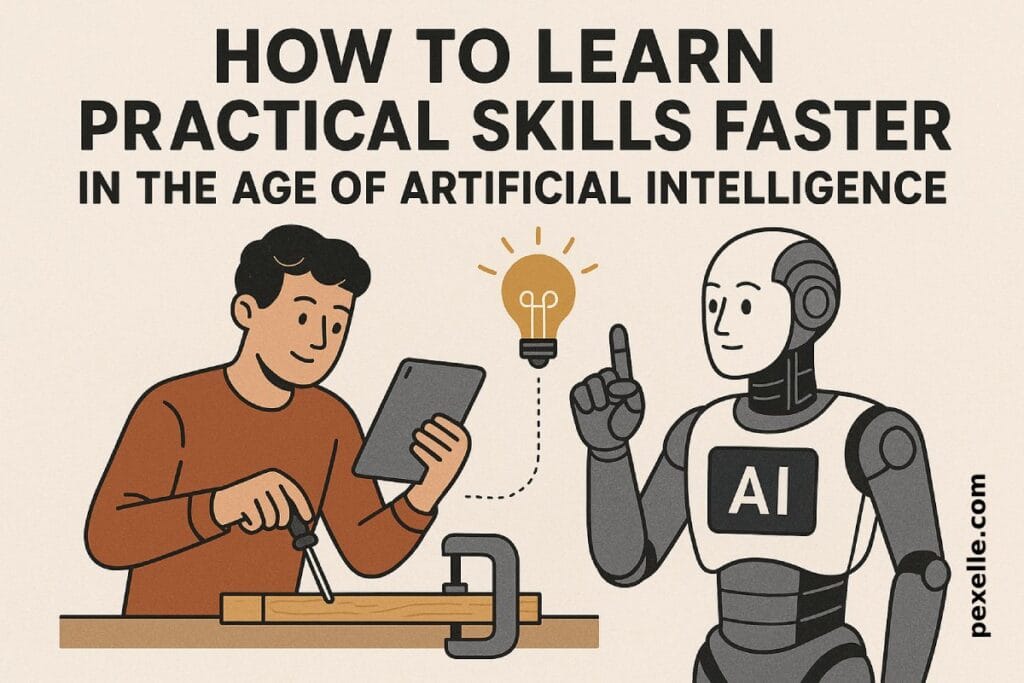How to Learn Practical Skills Faster in the Age of Artificial Intelligence

In today’s AI-driven era, the landscape of learning is undergoing a profound transformation. Artificial Intelligence (AI) is not only reshaping industries but also redefining how we acquire new skills—especially practical ones. Whether you’re a technician learning to use new machinery, a designer mastering a new tool, or a student entering a trade, AI offers both opportunities and strategies to accelerate hands-on learning.
🧠 The Shift from Passive to Active Learning with AI
Traditionally, acquiring practical skills required long hours of physical practice, mentorship, and classroom training. However, AI now facilitates active, personalized, and context-aware learning environments. Intelligent tutoring systems, like adaptive learning platforms and virtual coaches, can assess your current level, identify gaps, and offer customized learning paths. This means learners can bypass irrelevant content and focus on skill areas that matter most—saving time and increasing efficiency.
Key AI-enabled features include:
- Real-time feedback systems in simulation environments.
- Chatbots and AI tutors that answer specific, task-based queries.
- Gamified learning platforms that reward progression and correct errors interactively.
👨🔧 Learning-by-Doing: The Role of Simulations & Augmented Reality
One of the most impactful AI applications for learning practical skills is through immersive simulations and augmented reality (AR) tools. These technologies create risk-free environments where learners can practice as if they were operating in real conditions—such as fixing a car engine, running a welding torch, or conducting a medical procedure. AI tracks learner actions and provides corrections instantly.
Examples:
- AR apps for electricians to learn circuitry and installation without physical materials.
- Medical simulation bots for nurses and surgeons.
- Virtual lab environments for chemical or mechanical engineering students.
⚙️ Microlearning and Personalized Recommendations
Modern AI systems use data-driven personalization to deliver “just-in-time” content. Instead of traditional multi-hour lessons, learners are given short, skill-focused modules designed to be consumed quickly. This method, known as microlearning, aligns well with how the brain retains information through repetition and contextual relevance.
AI also uses recommendation engines similar to Netflix or Spotify to suggest the next logical step in your learning journey based on your performance, preferences, and goals.
🤖 AI-Powered Mentorship and Skill Communities
Practical skill acquisition is not just about tools—it’s also about learning from others. AI now powers mentorship platforms that match learners with experts globally based on shared goals, language, industry, or even personality fit. These platforms leverage natural language processing to summarize chats, suggest responses, and recommend resources, making mentorship more scalable and effective.
Furthermore, AI-curated forums and social learning groups (like on Discord or specialized platforms) help learners solve real-world problems together, turning every challenge into a learning opportunity.
🚀 How to Take Advantage of AI for Your Skill Development
To maximize your learning speed in this new age:
- Choose AI-enhanced platforms like Coursera, Skillshare, or Labster.
- Track your progress with AI dashboards and adjust learning paths as needed.
- Use AI tools such as ChatGPT to simulate expert conversations or generate tutorials.
- Engage with interactive learning communities powered by AI moderation.
- Practice regularly using simulations and virtual labs that mirror real-life tasks.
🌍 Final Thoughts
The age of artificial intelligence has unlocked a new era of experiential, personalized, and rapid learning. For those seeking to acquire practical skills—whether in trades, healthcare, engineering, or the arts—AI acts as an accelerator and enabler. It breaks down complex tasks, shortens the learning curve, and offers personalized guidance every step of the way. The key is to embrace these tools with curiosity and consistency.
In the 21st century, it’s not the strongest who will succeed, but those who learn fastest—and AI is here to help you do just that.
Source : Medium.com




